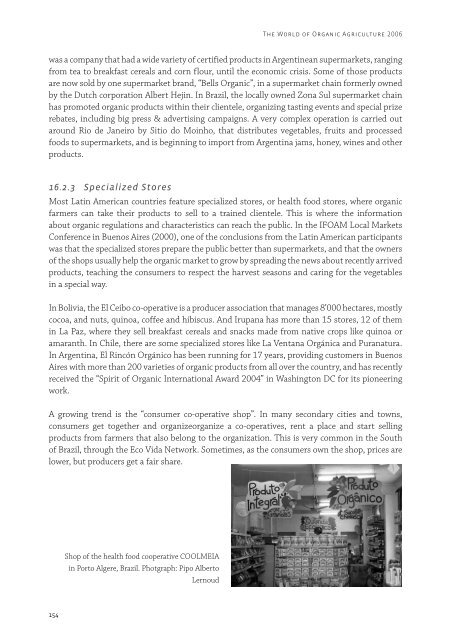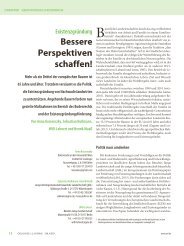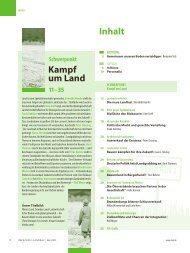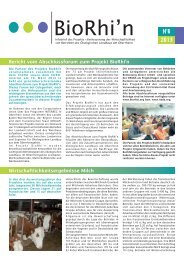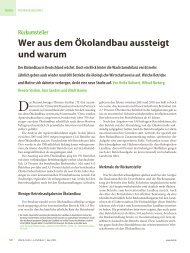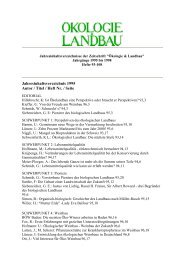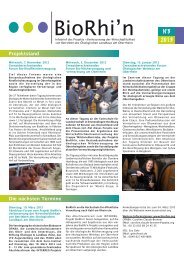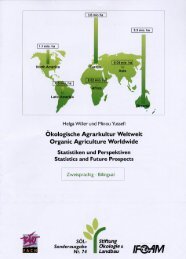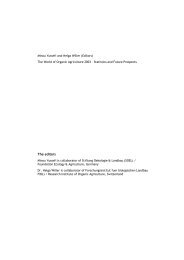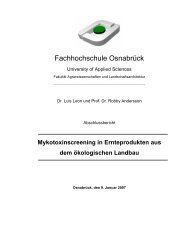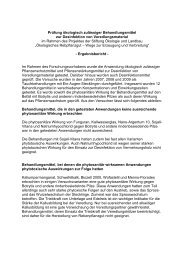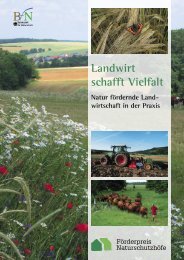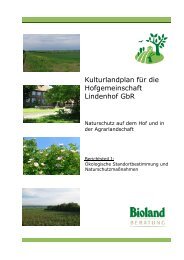the world of organic agriculture - Organic Eprints
the world of organic agriculture - Organic Eprints
the world of organic agriculture - Organic Eprints
You also want an ePaper? Increase the reach of your titles
YUMPU automatically turns print PDFs into web optimized ePapers that Google loves.
154<br />
The World <strong>of</strong> <strong>Organic</strong> Agriculture 2006<br />
was a company that had a wide variety <strong>of</strong> certified products in Argentinean supermarkets, ranging<br />
from tea to breakfast cereals and corn flour, until <strong>the</strong> economic crisis. Some <strong>of</strong> those products<br />
are now sold by one supermarket brand, “Bells <strong>Organic</strong>”, in a supermarket chain formerly owned<br />
by <strong>the</strong> Dutch corporation Albert Hejin. In Brazil, <strong>the</strong> locally owned Zona Sul supermarket chain<br />
has promoted <strong>organic</strong> products within <strong>the</strong>ir clientele, organizing tasting events and special prize<br />
rebates, including big press & advertising campaigns. A very complex operation is carried out<br />
around Rio de Janeiro by Sitio do Moinho, that distributes vegetables, fruits and processed<br />
foods to supermarkets, and is beginning to import from Argentina jams, honey, wines and o<strong>the</strong>r<br />
products.<br />
16.2.3 Specialized Stores<br />
Most Latin American countries feature specialized stores, or health food stores, where <strong>organic</strong><br />
farmers can take <strong>the</strong>ir products to sell to a trained clientele. This is where <strong>the</strong> information<br />
about <strong>organic</strong> regulations and characteristics can reach <strong>the</strong> public. In <strong>the</strong> IFOAM Local Markets<br />
Conference in Buenos Aires (2000), one <strong>of</strong> <strong>the</strong> conclusions from <strong>the</strong> Latin American participants<br />
was that <strong>the</strong> specialized stores prepare <strong>the</strong> public better than supermarkets, and that <strong>the</strong> owners<br />
<strong>of</strong> <strong>the</strong> shops usually help <strong>the</strong> <strong>organic</strong> market to grow by spreading <strong>the</strong> news about recently arrived<br />
products, teaching <strong>the</strong> consumers to respect <strong>the</strong> harvest seasons and caring for <strong>the</strong> vegetables<br />
in a special way.<br />
In Bolivia, <strong>the</strong> El Ceibo co-operative is a producer association that manages 8’000 hectares, mostly<br />
cocoa, and nuts, quinoa, c<strong>of</strong>fee and hibiscus. And Irupana has more than 15 stores, 12 <strong>of</strong> <strong>the</strong>m<br />
in La Paz, where <strong>the</strong>y sell breakfast cereals and snacks made from native crops like quinoa or<br />
amaranth. In Chile, <strong>the</strong>re are some specialized stores like La Ventana Orgánica and Puranatura.<br />
In Argentina, El Rincón Orgánico has been running for 17 years, providing customers in Buenos<br />
Aires with more than 200 varieties <strong>of</strong> <strong>organic</strong> products from all over <strong>the</strong> country, and has recently<br />
received <strong>the</strong> “Spirit <strong>of</strong> <strong>Organic</strong> International Award 2004” in Washington DC for its pioneering<br />
work.<br />
A growing trend is <strong>the</strong> “consumer co-operative shop”. In many secondary cities and towns,<br />
consumers get toge<strong>the</strong>r and organizeorganize a co-operatives, rent a place and start selling<br />
products from farmers that also belong to <strong>the</strong> organization. This is very common in <strong>the</strong> South<br />
<strong>of</strong> Brazil, through <strong>the</strong> Eco Vida Network. Sometimes, as <strong>the</strong> consumers own <strong>the</strong> shop, prices are<br />
lower, but producers get a fair share.<br />
Shop <strong>of</strong> <strong>the</strong> health food cooperative COOLMEIA<br />
in Porto Algere, Brazil. Photgraph: Pipo Alberto<br />
Lernoud


